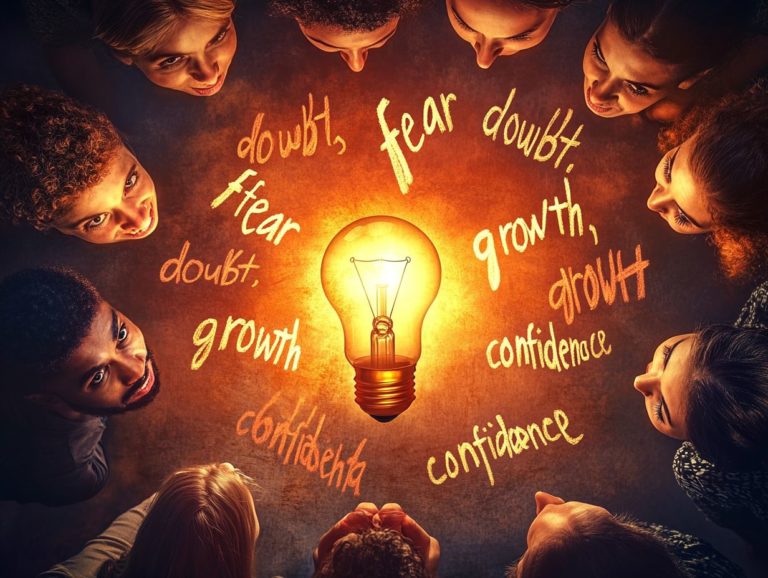The Importance of Emotional Intelligence
Emotional intelligence (EQ) transcends being merely a buzzword; it is an essential skill that influences every facet of your life, from personal relationships to professional achievements.
This article delves into the true essence of emotional intelligence and its vital significance. You will uncover its myriad benefits, such as enhanced mental well-being and more robust interpersonal connections.
This article presents practical strategies for developing your EQ, along with an examination of its impactful role in the workplace. Join in as you explore the profound connection between emotional intelligence and success.
Contents
- Key Takeaways:
- Understanding Emotional Intelligence
- The Benefits of Emotional Intelligence
- Enhanced Mental Health
- Developing Emotional Intelligence
- Practical Strategies for Improvement
- Emotional Intelligence in the Workplace
- Impact on Leadership and Team Dynamics
- Emotional Intelligence and Success
- Frequently Asked Questions
- What is emotional intelligence and why is it important?
- How does emotional intelligence impact personal and professional success?
- Can emotional intelligence be developed and improved?
- What are the benefits of having a high level of emotional intelligence?
- How can emotional intelligence help in managing stress and conflicts?
- Why is emotional intelligence important in leadership?
Key Takeaways:

- Emotional intelligence helps you understand and manage emotions.
- It enhances relationships and mental health.
- Developing skills like self-awareness and empathy leads to personal and professional success.
Understanding Emotional Intelligence
Understanding Emotional Intelligence (EI) means recognizing the significant influence emotions have on your interactions, decision-making, and the overall dynamics in your workplace.
Pioneered by researchers like Daniel Goleman, John Mayer, and Peter Salovey, EI includes abilities such as self-awareness, self-regulation, and emotional understanding skills that are essential for your personal growth and effective leadership.
Enhancing your EI not only improves your interpersonal relationships but also plays a crucial role in building a supportive work environment, making it a critical aspect of your professional development and organizational leadership journey.
Defining Emotional Intelligence
Emotional Intelligence (EI) is your ability to recognize, understand, and manage both your own emotions and those of others.
It includes several key components, such as self-awareness, which helps you identify your emotional triggers, and self-regulation, which allows you to control impulsive reactions. Emotional skills like empathy and social skills significantly enhance your interpersonal relationships.
These abilities not only improve communication but also foster stronger collaboration in professional settings. When you effectively harness your emotional intelligence, you cultivate a more harmonious environment both personally and professionally leading to greater success and fulfillment.
The Benefits of Emotional Intelligence
The benefits of Emotional Intelligence (EI) span multiple facets of your personal and professional life, profoundly influencing workplace culture and interpersonal relationships.
When you cultivate enhanced EI, you ll experience greater emotional well-being, heightened performance, and the capacity to tackle workplace challenges with resilience.
By nurturing a supportive environment, organizations like yours can harness the emotional skills of their teams, ultimately elevating overall engagement and effectiveness in the workplace.
Improved Relationships

Improved relationships stand out as one of the most significant benefits of Emotional Intelligence, as it fosters empathy and understanding among individuals. This enhanced sense of empathy allows you, as a leader, to connect more profoundly with your team, cultivating an environment where everyone feels valued and heard.
For instance, when you actively listen to your employees concerns, you not only demonstrate respect but also lay the groundwork for trust a crucial component for effective collaboration. Effective communication, bolstered by Emotional Intelligence, enables you to resolve conflicts with ease and fosters robust dialogue among team members.
When people feel understood, they are eager to collaborate, contributing to a workplace culture that champions innovation and productivity. Relationships anchored in empathy and trust ultimately pave the way for more successful outcomes in any context.
Don’t miss out on the chance to start applying these strategies for better emotional intelligence today!
Enhanced Mental Health
Enhanced mental health is intricately linked to the development of Emotional Intelligence (EI), which is the ability to understand and manage your own emotions and those of others. This connection enables you to manage your emotional responses and cope with stress more effectively.
Recognizing and understanding your own emotions, as well as those of others, fosters healthier interactions and reduces anxiety.
By cultivating skills such as self-awareness, empathy, and emotional regulation, you can navigate life s challenges with greater resilience.
Techniques like mindfulness meditation can sharpen your self-awareness. Journaling offers valuable insights into your emotional patterns.
Building strong interpersonal relationships through effective communication creates a supportive network that alleviates stress and promotes emotional growth.
Ultimately, harnessing these Emotional Intelligence strategies plays a crucial role in enhancing your overall well-being and stabilizing your mental health.
Developing Emotional Intelligence
Developing Emotional Intelligence requires a thoughtful approach that encompasses actionable strategies designed to improve how you manage your emotions and reactions.
These skills are vital for effective leadership and personal growth, giving you the power to navigate complex interpersonal dynamics with ease and confidence.
Practical Strategies for Improvement
Practical strategies for enhancing your Emotional Intelligence include techniques for emotional management, self-regulation, and nurturing self-awareness. These methods can truly transform how you relate to your emotions and respond to others.
Practicing deep breathing exercises helps you manage stress effectively. This gives you the opportunity to pause and reflect before reacting in intense moments.
Regularly journaling your emotions serves as an insightful tool for self-reflection. It helps you identify triggers and patterns in your behavior.
Engaging in mindful meditation cultivates a heightened awareness of your thoughts and feelings. This enhances your capacity to regulate your responses and communicate more effectively.
As a result, your daily interactions whether at work or in personal relationships become more empathetic and constructive, ultimately fostering deeper connections with others.
Emotional Intelligence in the Workplace

Emotional Intelligence is crucial for a thriving workplace, profoundly shaping leadership capabilities, enhancing team dynamics, and defining the overall culture within an organization. Understanding the importance of emotional intelligence in business can significantly benefit any organization.
Recognizing its impact allows you to foster a more cohesive and productive environment.
Impact on Leadership and Team Dynamics
The impact of Emotional Intelligence on leadership and team dynamics is nothing short of transformative. It significantly enhances your effectiveness as a leader while fostering a collaborative environment.
When you skillfully harness Emotional Intelligence, you can navigate the intricate landscape of human emotions. This allows you to connect with your team on a much deeper level.
For instance, when you actively listen to your employees concerns, you cultivate trust and open communication crucial elements for resolving conflicts. When your team members feel understood, they are far more likely to collaborate seamlessly.
Think about leaders like Satya Nadella, who completely transformed Microsoft’s culture by emphasizing empathy and inclusivity. This ignited innovation and elevated team morale.
By prioritizing Emotional Intelligence, you create a cohesive atmosphere where everyone feels valued and inspired to contribute to shared goals.
Emotional Intelligence and Success
The connection between Emotional Intelligence and success is becoming more widely acknowledged. Your Emotional Intelligence can profoundly impact your motivation strategies and ultimately shape your overall success in the workplace.
The Link Between EQ and Success
The connection between Emotional Intelligence (EQ) and success is strikingly clear. Individuals with high EQ often excel in performance and exhibit strong leadership capabilities.
Research shows that professionals with high emotional awareness skillfully navigate workplace dynamics, resolve conflicts effectively, and foster collaboration among their peers. These individuals not only boost team productivity but also enhance employee morale.
Consider leaders like Satya Nadella, CEO of Microsoft, who exemplify these emotional skills by nurturing a culture of empathy and inclusivity. Isn’t it fascinating how such leadership results in remarkable organizational transformations? Similarly, Sheryl Sandberg, co-founder of LeanIn.org, demonstrates how high emotional awareness can uplift and motivate teams, ultimately driving innovation and growth.
These examples underscore how cultivating emotional intelligence can be a true game changer in today s competitive professional landscape.
Frequently Asked Questions

What is emotional intelligence and why is it important?
Emotional intelligence is the ability to understand and manage one’s own emotions as well as the emotions of others. It is crucial because it allows individuals to have better self-awareness, build stronger relationships, and effectively cope with stress and challenges.
How does emotional intelligence impact personal and professional success?
Emotional intelligence plays a key role in both personal and professional success. It enables individuals to communicate effectively, handle conflicts, and make sound decisions. Additionally, it helps in building strong leadership skills and fosters a positive work environment.
Can emotional intelligence be developed and improved?
Yes, emotional intelligence is not a fixed trait and can be developed and improved through self-awareness, practice, and learning new skills. It requires consistent effort and dedication, but it is achievable for everyone.
What are the benefits of having a high level of emotional intelligence?
Having a high level of emotional intelligence brings numerous benefits, including better communication and relationships, improved decision-making ability, increased empathy towards others, and overall mental well-being.
How can emotional intelligence help in managing stress and conflicts?
Emotional intelligence allows individuals to recognize and understand their own emotions, which helps them regulate and manage them effectively. This skill aids in managing stress and conflicts by enabling individuals to remain calm and rational in challenging situations.
Why is emotional intelligence important in leadership?
Emotional intelligence is essential for effective leadership as it enables leaders to understand and empathize with their team members, communicate effectively, and make sound decisions. It also helps in creating a positive work culture and fosters a motivated and engaged team.
Start your journey to improve your emotional intelligence today!






